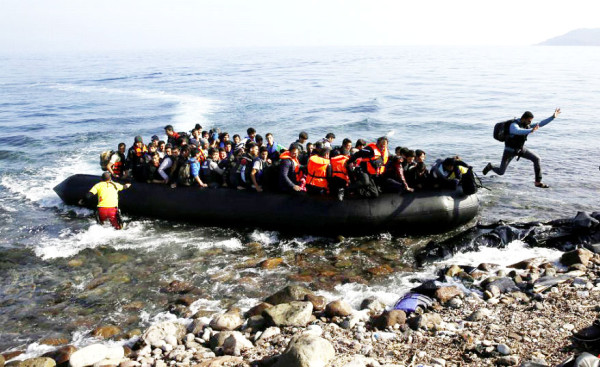BERKASOVO, SERBIA/LJUBLJANA (Reuters) The Balkans struggled with a growing backlog of migrants yesterday after Hungary sealed its southern border and Slovenia tried to impose a limit, leaving thousands stranded on cold, rain-drenched borders where tempers frayed.
Having declared it would accept only 2,500 per day, Slovenia said 5,000 had arrived from Croatia yesterday.

Around 2,000 more trekked through fields and along railway tracks over the border, having apparently arrived by train; they were rounded up by Slovenian police on the other side as a helicopter circled overhead, and escorted to a camp with capacity for 400, a Reuters reporter said.
“Croatia is ignoring our pleas, our plans,” Bostjan Sefic, state secretary at Slovenia’s interior ministry, told a news conference, saying the army would be called in to help if such a rate continued.
Attempts by Slovenia to ration the flow since Hungary sealed its border with Croatia at midnight on Friday have triggered a knock-on effect through the Balkans; Croatia began holding back new arrivals and Serbia said it might do the same on its border with Macedonia. More than 10,000 were stranded in Serbia, the United Nations refugee agency (UNHCR) said, with more on the way but nowhere to go.
“It’s like a big river of people, and if you stop the flow, you will have floods somewhere. That’s what’s happening now,” UNHCR spokesman Melita Sunjic said from the Serbia-Croatia border, where about 2,000 people were forced to wait in a filthy, muddy no-man’s land.
The UNHCR later said that police let the crowd of 2,000-3,000 through shortly before dusk.
“I left my pregnant wife in Syria,” said Mohammed Habian, a 22-year-old Syrian from the devastated city of Homs on entering Serbia from Macedonia. “There is nothing that can stop us reaching freedom.”
Groups of migrants fought with each other in the morning, aid workers said, after a night spent under open skies, lashed by autumn wind and rain.
“Open the gate, open the gate!” they chanted, their passage barred by lines of Croatian police who erected an improvised fence to ration access.
Slovenia found itself dragged into the path of the greatest migration of people in Europe since World War Two after Hungary sealed its border with Croatia to migrants on Friday.
A country of 2 million people bordering Hungary, Italy, Austria and Croatia, Slovenia said it would only allow in as many as it could register, accommodate and send on to Austria.
It said Austria had limited its own intake, something Vienna denied. Most refugees want to reach Germany, which for the moment is letting them enter.





